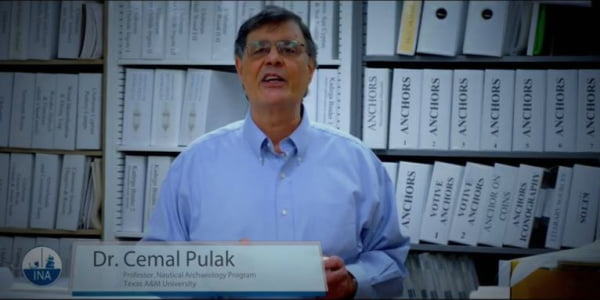The Yenikapı site, located in the Istanbul neighborhood of the same name, witnessed one of the world’s largest archaeological digs between 2004 and 2013. During the construction of a new subterranean rail line linking Europe and Asia, hundreds of laborers and archaeologists of the Istanbul Archaeological Museums exposed remains of over 8,000 years of the city’s history, ranging from Neolithic dwelling foundations and burials to Ottoman cisterns and workshops. Most of the finds, however, originated from Constantinople’s Theodosian Harbor, an artificial commercial harbor built during the reign of Byzantine emperor Theodosius I (AD 379-395). This harbor was extensively used from the 4th to 11th century AD, after which the effects of gradual siltation had rendered it accessible only to small watercraft. By the 16th century, the harbor was completely filled in, and its remains lay forgotten for centuries. Thanks to the waterlogged anaerobic sediments that filled the harbor at Yenikapı, an impressive range of Byzantine finds were preserved at the site, including organic objects of wood, rope and leather, as well as pottery, bones, glass, coins, and other metalwork. In addition to hundreds of anchors and other items of ship’s equipment, archaeologists also uncovered several exceptionally well preserved shipwrecks of 5th- to late 10th- or early 11th-century AD date. These include the first archaeological examples of Byzantine rowed ships or galleys—almost certainly warships—as well as merchant vessels, a few with undisturbed amphora cargoes.
Eight Byzantine Shipwrecks from the Lost Harbor of Theodosius
Vedat Doğusel: İlk altı ayda en çok ihracat Derince’den
Borusan Tedarik, CMA CGM’ye geçiyor
Ege üniversitesi öğrencilerine ROV desteği
Cecon Vigor suyla buluştu
Rosatom: “Kuzey Deniz Yolu üzerinden sevkiyatı arttı”
ULAQ 12 tüm atış testlerini tamamladı
GEMDTEK’ten Rotamız Ufkun Ötesi zirvesi
Denizcilik sektörüne gümrük muafiyeti kolaylığı düzenlemesi
ABD'nin Çin hamlesi en çok konteyner sektörünü etkileyecek
Rus denizaltılar Akdeniz’de kaldı
Samsun'da 'kruvaziyer liman' projesine bakanlıktan onay!
Marmara Denizi’ne deniz tabanı sismometresi


